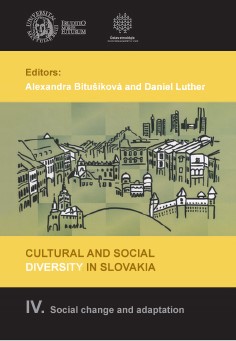ACCEPTATION OF LGBTI MOVEMENTS IN THE CURRENT SOCIO-POLITICAL CONTEXT
ACCEPTATION OF LGBTI MOVEMENTS IN THE CURRENT SOCIO-POLITICAL CONTEXT
Author(s): Vendula Wiesnerová
Subject(s): Gender Studies, Media studies, Human Rights and Humanitarian Law, Politics and society, Sociology of Politics
Published by: SAV - Slovenská akadémia vied - Ústav etnológie a sociálnej antropológie Slovenskej akadémie vied
Keywords: LGBT movements; Socio-political context; social phenomena; Slovakia;
Summary/Abstract: With the formation of a democratic society in Slovakia, some new social phenomena started to raise attention, including new models of co-existence, as well as nonheterosexual partnerships and relationships in general. This period is characterised by the emergence of new civil topics, successfully developed at a European scale, which have, however, provoked a whole range of reactions within the society, among the representatives of state institutions, and within the conservative circles of the Catholic Church. The civil society development after 1989 resulted in the creation of an activist network of organisations and associations which joined the process of raising public awareness and formulating requirements with the aim to achieve better acceptance of LGBTI people through the modification of civil rights. This prolonged process of adaptation of the society to the acceptance of new forms of gender expressions, coexistence, partnership and family, which are mainly disseminated by people identifying themselves with any of the categories referred to by the abbreviation LGBTI movement, has recently brought concrete results. The recent development in Slovakia is influenced, inter alia, by increased sensitiveness to human rights topics in the European society, and by the overall situation in the world which has been characterised in the past years by important changes concerning the equal status of non-heterosexual relationships (France, USA), and the adoption of legislation on gender identity (Argentina, Australia). As the recent surveys of FOCUS Agency conducted for Iniciatíva Inakosť (Otherness Initiative) suggest, this situation has an impact on the creation of a positive environment also within the Slovak society (Iniciatíva Inakosť 2012). Activists consider the establishment of the Committee for the Rights of Lesbians, Gays, Bisexual, Transgender and Intersexual People (LGBTI Committee) at the Government Council of the Slovak Republic for Human Rights, Ethnic Minorities and Gender Equality (hereinafter referred to as “Government Council”) in 2012 as an important move forward in the development of these issues in Slovakia. The creation of this Committee, however, cannot be viewed as a clear influence of bigger social tolerance and of a more liberal attitude to these issues.
Book: Cultural and social diversity in Slovakia iv. social change and adaptation
- Page Range: 64-72
- Page Count: 9
- Publication Year: 2013
- Language: English
- Content File-PDF

